The Best Skinny Fat Diet, According to Science

Having scientifically clarified how to fix skinny fat, what is the best skinny fat diet, according to the latest science?
The latest scientific research indicates that a low-carb diet (1, 2, 3, 4, 113) — properly executed by focusing on balanced, clean, whole foods rich in high-quality calories (energy) including high-quality protein, fats, and fiber-focused carbs (adult males need 28 to 38 grams (5, 6, 7, 8) of fiber daily and females 21 to 28 grams (5, 6, 7, 8); 6 to 8 grams should be soluble) along with clean water, AKA macronutrients, as well as micronutrients (vitamins, minerals, antioxidants) — is the best skinny fat diet (especially the more (54) skinny fat (106) you are experiencing). Avoid fast, junk, and processed food — IE ultra-processed foods (UPFs).
Why? Because safely, sustainably, and successfully losing regular white/yellow body fat/adipose tissue (visceral and subcutaneous)(105) has proven to be one of the top three most effective solutions to reduce and manage skinny fat (subcutaneous/lack of genetic muscle tissue)(106).
Regular Fat Weight Loss – The Best Skinny Fat Diet, According to Science
For acute regular fat weight loss (3 to 8.5 months or so)(135, 136, 1), eat a low-carb diet with a bullseye of 37 grams (no less than 30)(3) of mostly fiber carbs to safely, sustainably, and successfully lose regular fat weight. Religiously counting calories (9, 10, 11, 3) is not required (but be aware of your Standard BMR and TDEE calories) nor is a calorie deficit (12, 13, 3, 10) (which can lead to a slow metabolism/survival mode, hinder/plateau regular fat weight loss, cause muscle tissue loss, and damage health, if done incorrectly, like with starvation diets).
(The above video is Dr. Traci Mann from the University of Minnesota explaining her Health and Eating Lab and why weight loss is so much more than just will-power and CICO)
The unfortunate truth is, the vast majority of people (85+%) on a calorie deficit diet (like Eat Less Move More/ELMM) gain most if not all the regular fat weight back (96, 97, 98, 99, 12, 79), if not more. This is because the body adjusts/slows metabolism to meet the new calorie deficit, leading to a plateau. Lower calories further, and the body adjusts again (including hormones like insulin, leptin, ghrelin, etc.); plateau.
Starvation For Weight Loss is Not Sustainable or Healthy and Never Will Be
Priceless genetic default muscle/mass is typically lost (148, 149, 150), slowing metabolism further. Once you start eating normally again, the body immediately starts to store regular fat (calories) to recover from the last starvation event and prepare for the next starving event (survival). While, for many people (body composition matters), maintaining a slower metabolism (less energy/fewer BMR calories burned)(96, 117) going forward.
With a properly executed low-carb diet, you don’t even have to exercise. Although exercise is very important for overall health and managing fitness, not just weight loss. And proper exercise (60) can speed up regular fat weight loss.
This video (4) explains the latest science from the leading experts:
Remember, a calorie is NOT a calorie (14, 15, 16); food type, quality, and quantity matter. A 500-calorie bag of refined white sugar is 100% not the same as a 500-calorie clean, whole food meal that is balanced with proper nutrition.
Avoid fast, junk, and processed food. Once you successfully lose the regular white/yellow fat weight, increase your daily carb intake to 50 to 150 or so grams of fiber-focused carbs from well-chosen, clean, high-quality calorie whole food. How many carbs is best for your specific body depends on your unique genetics including body composition (particularly skinny fat/lack of genetic muscle) and metabolism.
The more skinny fat tissue (cellulite, thin fat)(106) you have, the more diligent you will have to be with your diet, exercise, and lifestyle consistently throughout your life to keep excess regular fat off and being overweight or obese at bay.
Best Skinny Fat Diet – What Does Low Carb Mean?
Generally, a safe low carb diet is defined as approximately 37 to 150 or so grams of carbs (roughly <26% of total daily calories)(1, 2, 3, 4, 135). But how much depends on each specific person and their unique genetics including body composition.
Carbohydrates (17) (4 calories per gram) are sugars, starches, and fiber (soluble and insoluble). Carbs, particularly sugar carbs, are turned into glucose (blood sugar) by your body to give you the energy (calories) needed to function. Insulin (101, 102, 103, 104), a hormone produced by the pancreas, regulates blood sugar levels and helps the body convert food/drink (calories/metabolism) into energy, including influencing calorie storage as white/yellow fat/adipose tissue (regular body fat).
Refined Sugar and Starch Carbs
Muscle is a major insulin-sensitive tissue (141, 142, 143). Less muscle tissue (more skinny fat) negatively impacts glucose uptake and metabolism, at least. This directly affects insulin resistance, type-2 diabetes (the body stops responding properly to insulin and/or the pancreas fails to produce enough insulin), and regular white/yellow body fat/adipose tissue weight gain (and loss), particularly being overweight or obese.
The more refined and processed the carb (sugar or starch), the more blood glucose (spike) your body has to process, in general. Over time, too much can lead to insulin resistance (18, 19, 20) and eventually type-2 diabetes, being overweight, and obesity, no less. The more skinny fat tissue a person has, the more likely this is to occur.
Your body turns to the gluconeogenesis (21, 22, 23) metabolic pathway to break down lipids (fats) and proteins (amino acids) into glucose for fuel (calories) in the absence or deficiency of sugar/starch carbs. This results in less blood glucose (no spike) — and thus less insulin — to process. In terms of sugar consumption, no more than 24 grams (6 teaspoons) for women and 36 grams (9 teaspoons) for men; avoid added sugar/refined sugar. Whole fruit is best, but also high-quality honey or blackstrap molasses, in strict moderation.
Types of Low Carb Diets
Some people tolerate a high-fat diet and might be good candidates for the ketogenic (keto) low-carb diet (ketosis – usually 20 to 50 grams of carbs daily). While other people, not so much. There is debate about the sustainability of the keto diet which can lead to or exacerbate gallbladder, digestive, and other health issues (24, 25, 107), no less.

Some people tolerate a high-protein diet and might be good candidates for the Atkins low-carb diet (typically 20 to 40 grams of carbs). However, there is some debate (26, 27) about how much high protein affects digestion, organs — especially the kidneys — and overall health.
And, it is a fact that the body requires fiber (108, 109, 110, 111) for proper digestion (happy gut flora), no less. The feeling of being full goes hand-in-hand with fiber. Fiber is typically deficient in more extreme versions (0-19 grams of carbs per day) of the Atkins and keto diets (carnivore diet, etc.). And fiber is already deficient (112) in the Standard American Diet (SAD).
Glycemic Index (GI)
The Glycemic Index (GI) (28) diet allows for all types of food (even empty-calorie and low-quality calorie and poor-quality fast, junk, and processed food) and is judged by the low, medium, and high GI chart (29) — the lower the GI, the better. This diet may appeal more to people who are genetically blessed with the ALK skinny gene (30, 31, 32, 33) and/or Standard Body Type One (BT1), especially the younger they are, as they likely will get away with eating low-quality fast, junk, and processed food regularly and consistently. Although your body is keeping score and even though you might not gain weight eating such low-quality food, cancer and other diseases thrive on aggregate unhealthiness (you are what you eat/assimilate).
The GI chart can compliment any low carb diet. Just exclude all low-quality fast, junk, and processed foods and the like, as needed. Well, except maybe on cheat days.
The Best Overall Diet – According to Science
Out of all (140) the known scientific diets, the best scientific diet for sustainable short- and long-term regular fat maintenance, muscle maintenance, and skinny fat reduction is the consistent U.S. News and World Report #1-rated Mediterranean Diet (40, 41, 42, 43, 44, 45) consumed in balanced, clean whole-food meals that can be low carb. The Mediterranean Diet is scientifically rated to be best for insulin resistance, diabetes, obesity, LDL and HDL cholesterol, anti-inflammation (anti-inflammatory), heart health, bone and joint health, healthy eating in general, aging, longevity, being the easiest to follow, and the most family-friendly. As well as the Pesco-Mediterranean Diet (46).
These — and others (140) — can be healthily executed as a vegan-leaning omnivore diet (if sensitive to dairy, carefully managing calcium and other nutrients) or vegetarian-leaning omnivore diet.
How many carbs depends on your genetics. Some people function better between 50 to 150 or so fiber-focused carbs. Other people can eat more carbs. Some fewer (although fiber is vital). Each person will need to figure out what is best for them and their unique genetics (137, 138, 139, 106).
Protein and Fat
As well, depending on age and activity, no less, eat 0.8 to 1.6 grams (34, 35, 36) of lean, quality protein (4 calories per gram) per kg of body weight. Bodybuilders, amateur/pro athletes, etc. will likely require more.
For fat, the typical adult needs 20–35% (37, 38, 39) of high-quality (like extra-virgin olive oil) fat (9 calories per gram) per day or roughly 44 to 78 grams if your Standard BMR is 2000 calories. Saturated fat should make up no more than 20 grams (or less than 10% of the total calories you consume each day, closer to 5-6% is likely best) to keep high-density (HDL/good) and low-density (LDL/bad) cholesterol levels healthy, no less. Avoid fast, junk, and processed foods.
Low Carb Meals, Snacks, and Hydration – Best Scientific Skinny Fat Diet
There are many low-carb meal (47) and recipe (48) options. Not to mention plenty of snacks (49) including fruits (50) and vegetables (veggies) (51). Stay hydrated with enough clean water, no less than four to six cups (52) of plain water each day, depending on activity levels, weather, and overall health. You can also choose tea, coffee, milk, kombucha, and such, along with food, to get a total of about 15.5 cups (3.7 liters)(53) of fluids a day for men and 11.5 cups (2.7 liters)(53) for women.
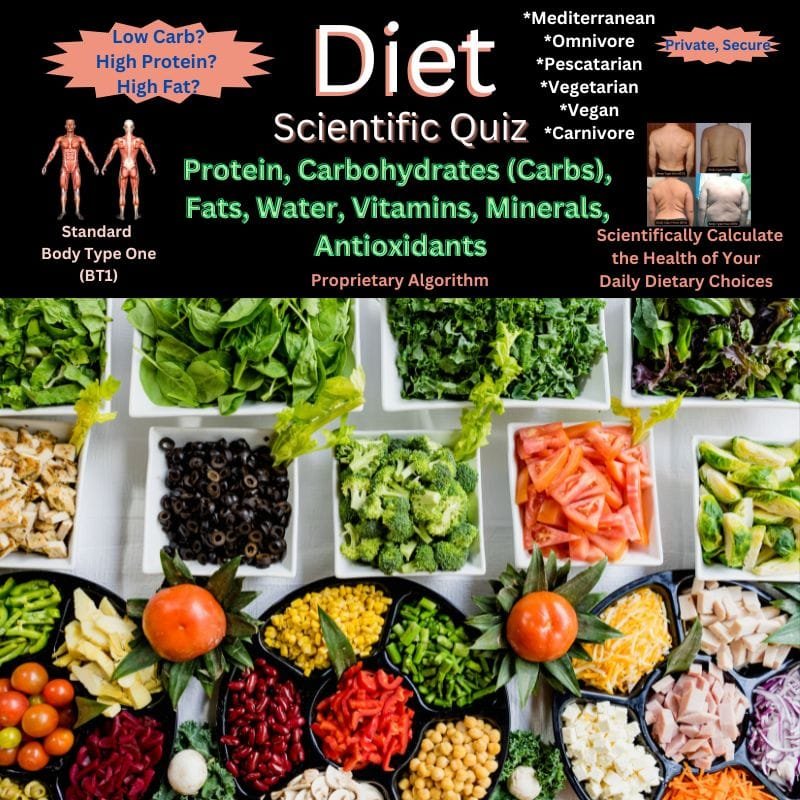 Keep in mind, your unique genetic body composition (54), food and hydration choices, gut microbiome/flora/good bacteria (55, 56, 57, 58, 130) including prebiotics (fiber) and probiotics (yogurt, kimchi, kefir, sauerkraut, miso, kombucha, tempeh, etc.), immunity (128, 129), exercise (59), and lifestyle (sleep, stress, etc.)(60) all affect your metabolism (61), which directly influences your regular fat weight loss and management efforts. The Scientific Diet Quiz Health Score (62) and Scientific Metabolism Quiz Health Score (63), two of the Scientific Health Quizzes, utilize the latest scientific data and formulas in proprietary algorithms to accurately calculate your unique metrics.
Keep in mind, your unique genetic body composition (54), food and hydration choices, gut microbiome/flora/good bacteria (55, 56, 57, 58, 130) including prebiotics (fiber) and probiotics (yogurt, kimchi, kefir, sauerkraut, miso, kombucha, tempeh, etc.), immunity (128, 129), exercise (59), and lifestyle (sleep, stress, etc.)(60) all affect your metabolism (61), which directly influences your regular fat weight loss and management efforts. The Scientific Diet Quiz Health Score (62) and Scientific Metabolism Quiz Health Score (63), two of the Scientific Health Quizzes, utilize the latest scientific data and formulas in proprietary algorithms to accurately calculate your unique metrics.
Is a Low-Carb Diet Better Than Glucagon-Like Peptide-1 (GLP-1) Drugs (Semaglutides like Ozempic, Wegovy, or Rybelsus, and the Like)?

According to clinical trials, it takes roughly 4 to 5 weeks (64, 65) to reach a steady level of the glucagon-like peptide-1 (GLP-1) drug (semaglutide, dulaglutide, exenatide, liraglutide, lixisenatide) in your system, with full effects likely not seen until at least week 8 of treatment. Typical regular fat weight loss is around 2.2 pounds (1 kg) or about 1.1% of body weight after one month. After two months, it’s around 4.5 pounds (2 kg) or 2.2% of body weight. Then, roughly 15 pounds after three months and about 27 pounds after six months (66, 67, 68), which translates to approximately 5 pounds of weight loss per month.
Not really that impressive, all things considered.
If you can afford GLP-1 drugs like Ozempic, Wegovy, or Rybelsus out of pocket (insurance does not cover it for most people for weight loss), find a doctor to prescribe it for weight loss (it is usually for type-2 diabetes), find it in stock, are willing to tolerate the stout list of severe side effects, and are willing to take it forever (as soon as you stop taking it you gain all the weight back and likely more), then this regular fat weight loss strategy might be for you. But it most certainly is not a miracle solution.
Low Carb Done Right
Whereas, if you follow the latest science and execute a low-carb diet properly, you can wrangle (69, 70, 90, 101) type 2 diabetes and insulin resistance while safely, sustainably, and successfully turning your body into a regular fat-burning machine to lose regular fat  weight, keep being overweight or obese at bay, and manage things in the short and long term without the side effects, risks, or high costs. Throw in consistent, regular exercise like walking, and you can lose 1–2 pounds (71, 72, 73) on average of regular fat per week — 4–8 pounds per month on average.
weight, keep being overweight or obese at bay, and manage things in the short and long term without the side effects, risks, or high costs. Throw in consistent, regular exercise like walking, and you can lose 1–2 pounds (71, 72, 73) on average of regular fat per week — 4–8 pounds per month on average.
Proper, safe short-term fasting (74) can also be beneficial, including intermittent fasting (75, 76, 77, 78), done right, as when you eat and drink matters and affects insulin hormone activity, no less. Like eating and drinking (water is the exception, in moderation) in a consistent 10-12 hour window every day (at least 3 hours (118, 119, 147) before bed is best for deep sleep repair and regeneration, weight management, and metabolism), then not eating and drinking for 12-14 hours. Note: although more research is certainly needed, a short-term (safe regular fat weight loss) 8-hour window is associated with positive health benefits (120, 121, 122, 123), but an 8-hour window consistently is loosely (127) linked to increased cardiovascular risk (124, 125, 126, 151, 152) along with overhyped benefit and other potential health concerns like muscle loss.
Calorie Deficit
A safe, short-term, proper calorie deficit (typically 300 to 500 calories below Standard BMR/TDEE of high-quality, balanced, nutrient-rich food)(80, 81) done right (do NOT starve your body)(79, 96, 97, 98, 99, 100) can also help speed things up for some people (but not all, for many people – especially those experiencing genetic skinny fat tissue – a calorie deficit will slow metabolism (115, 116, 117, 96)).
As mentioned, your unique genetics/body composition (82, 131) directly affects your regular fat weight loss and management endeavors, no less, including skinny fat reduction and management, if you are experiencing it.
Maintaining Default Genetic Muscle Mass – Best Skinny Fat Diet

The human body will always burn calories consumed from food and calories from stored regular white/yellow fat first (83, 84). It does not casually and arbitrarily burn priceless genetic default muscle/mass. It will only do so if you are starving it/denying it the nutrients it requires, which is all too common in antiquated calorie-deficit CICO (calorie in, calorie out) calorie-is-a-calorie diets.
Type of diet matters, and there is not one single weight loss study with data that knows the specific muscle/mass tissue levels (MRI or CT/CAT scans(114)) of each participant BEFORE weight loss. Muscle mass levels were estimated with inaccurate (at best)(132, 133, 134, 114, 145, 146) DEXA/DXA scans, hydrostatic/underwater weighing, Inbody bioelectrical impedance analysis (BIA), lean body mass and/or body fat calculations (percentage, waist-to-hip ratio/WHR, etc.) or the like. Please comment below with a study that proves otherwise.
A properly executed low-carb diet (144, 85) does not require a calorie deficit, which helps maintain genetic default muscle/mass while reducing skinny fat (if you are genetically experiencing it) and avoiding eating disorders (anorexia nervosa, bulimia nervosa, binge eating disorder (BED), etc.) (86, 87, 88, 89). It is also more conducive to healthy (90, 91, 92) aging and longevity, especially vegetarian/vegan/omnivore versions in terms of centenarians (people who live to 100 years or older)(93, 94, 95).
What is the Best Skinny Fat Exercise, According to Science?
References
- Healthline: 23 Studies on Low Carb and Low Fat Diets — Time to Retire the Fad, March 24, 2020, Kris Gunnars, BSc (Medically reviewed by Atli Arnarson BSc, PhD). https://www.healthline.com/nutrition/23-studies-on-low-carb-and-low-fat-diets
- Harvard T.H. Chan School of Public Health: Low-Carbohydrate Diets, https://nutritionsource.hsph.harvard.edu/carbohydrates/low-carbohydrate-diets/
- NIH, National Library of Medicine: Low-Carbohydrate Diet, August 17, 2023, Robert Oh; Brian Gilani; and Kalyan R. Uppaluri. https://www.ncbi.nlm.nih.gov/books/NBK537084/
- Today Show: Can’t lose weight by eating less? Why low-carb diets may be the solution, June 06, 2022, , and
- WebMD: Fiber: How Much Do You Need?, April 6, 2016, Kathleen M. Zelman, RD, LD, MPH (Medically reviewed by Jennifer Robinson, MD ). https://www.webmd.com/food-recipes/features/fiber-how-much-do-you-need
- Healthline: How Much Fiber Should I Eat Per Day?, May 30, 2023, Brett Smiley (Medically reviewed by Katherine Marengo LDN, R.D., Nutrition). https://www.healthline.com/health/food-nutrition/how-much-fiber-per-day
- Academy of Nutrition and Dietetics: Easy Ways to Boost Fiber in Your Daily Diet, March 1, 2021, Holly Larson, MS, RD. https://www.eatright.org/health/essential-nutrients/carbohydrates/easy-ways-to-boost-fiber-in-your-daily-diet
- University of California at San Francisco, UCSF: Increasing Fiber Intake. https://www.ucsfhealth.org/education/increasing-fiber-intake
- Harvard Health Publishing: Stop counting calories, October 1, 2020. https://www.health.harvard.edu/staying-healthy/stop-counting-calories
- NIH, National Library of Medicine: Reducing Calorie Intake May Not Help You Lose Body Weight, June 28, 2017,
- Harvard Health Publishing: There’s no sugar-coating it: All calories are not created equal, November 4, 2016, Celia Smoak Spell. https://www.health.harvard.edu/blog/theres-no-sugar-coating-it-all-calories-are-not-created-equal-2016110410602
- CNN Health: How your body fights back when you diet, March 19, 2018, Traci Mann and A. Janet Tomiyama, The Conversation. https://www.cnn.com/2018/01/02/health/body-fights-dieting-food-partner/index.html
- Healthline: 5 Ways Restricting Calories Can Be Harmful, January 13, 2017, Alina Petre, MS, RD (NL). https://www.healthline.com/nutrition/calorie-restriction-risks#TOC_TITLE_HDR_2
- Healthline: 6 Reasons Why a Calorie Is Not a Calorie, June 29, 2023, Kris Gunnars, BSc. https://www.healthline.com/nutrition/6-reasons-why-a-calorie-is-not-a-calorie
- NIH, National Library of Medicine: Is a Calorie Really a Calorie? Metabolic Advantage of Low-Carbohydrate Diets, December 31, 2004, Anssi H Manninen. https://www.ncbi.nlm.nih.gov/pmc/articles/PMC2129158/
- BMC, Nutritional Journal: “A calorie is a calorie” violates the second law of thermodynamics, July 28, 2004, Richard D Feinman and Eugene J Fine. https://nutritionj.biomedcentral.com/articles/10.1186/1475-2891-3-9
- Cleveland Clinic: Carbohydrates, last reviewed on 03/08/2024. https://my.clevelandclinic.org/health/articles/15416-carbohydrates
- NIH, National Institute of Diabetes and Kidney Disease: Insulin Resistance & Prediabetes, https://www.niddk.nih.gov/health-information/diabetes/overview/what-is-diabetes/prediabetes-insulin-resistance#:~:text=Insulin%20resistance%20is%20when%20cells,help%20glucose%20enter%20your%20cells.
- NIH, National Library of Medicine: Ultra-Processed Food Consumption and Adult Diabetes Risk: A Systematic Review and Dose-Response Meta-Analysis, December 9, 2021, Sajjad Moradi, Mohammad ali Hojjati Kermani, Reza Bagheri, Hamed Mohammadi, Ahmad Jayedi, Melissa M Lane, Omid Asbaghi, Sanaz Mehrabani, and Katsuhiko Suzuki. https://pmc.ncbi.nlm.nih.gov/articles/PMC8705763/
- NIH, National Library of Medicine: Relationship between Ultra-Processed Food Consumption and Risk of Diabetes Mellitus: A Mini-Review, July 7, 2022, Muneerh I Almarshad, Raya Algonaiman, Hend F Alharbi, Mona S Almujaydil, and Hassan Barakat. https://pmc.ncbi.nlm.nih.gov/articles/PMC9228591/
- VeryWell Fit: Gluconeogenesis on a Low Carb Diet, December 3, 2021, Laura Dolson (Medically reviewed by Barbie Cervoni MS, RD, CDCES, CDN). https://www.verywellfit.com/gluconeogenesis-2242007
- Wikipedia: Gluconeogenesis. https://en.wikipedia.org/wiki/Gluconeogenesis
- NIH, National Library of Medicine: Physiology, Gluconeogenesis, Movember 13, 2023, Erica A. Melkonian, Edinen Asuka, and Mark P. Schury. https://www.ncbi.nlm.nih.gov/books/NBK541119/
- UChicagoMedicine: Ketogenic diet: What are the risks?, January 23, 2023, Natalie Helms. https://www.uchicagomedicine.org/forefront/health-and-wellness-articles/2023/january/ketogenic-diet-what-are-the-risks
- Harvard Health Publishing: Should you try the keto diet?, March 28, 2024, Howard E. LeWine, MD, Chief Medical Editor. https://www.health.harvard.edu/staying-healthy/should-you-try-the-keto-diet
- Healthline: Is Too Much Protein Bad for Your Health?, April 27, 2018, Kris Gunnars, BSc. https://www.healthline.com/nutrition/is-too-much-protein-bad-for-you
- MedicalNewsToday: How much protein is too much?, November 15, 2023, Jennifer Huizen (Medically reviewed by Katherine Marengo LDN, R.D., Nutrition). https://www.medicalnewstoday.com/articles/322825
- Harvard Health Publishing: A good guide to good carbs: The glycemic index, April 14, 2023. https://www.health.harvard.edu/healthbeat/a-good-guide-to-good-carbs-the-glycemic-index
- Glycemic Index Guide: Glycemic Index Chart: Glycemic index and glycemic load ratings for 500+ foods. https://glycemic-index.net/glycemic-index-chart/
- CNN: Scientists say they may have found a skinny gene, May 1, 2020, Katie Hunt. https://www.cnn.com/2020/05/21/health/thin-gene-trnd-wellness/index.html
- NIH, National Library of Medicine: Identification of ALK in Thinness, June 11, 2020 (Epub 2020 May 21), Michael Orthofer, Armand Valsesia, Reedik Mägi, Qiao-Ping Wang, Joanna Kaczanowska, Ivona Kozieradzki, Alexandra Leopoldi, Domagoj Cikes, Lydia M Zopf, Evgenii O Tretiakov, Egon Demetz, Richard Hilbe, Anna Boehm, Melita Ticevic, Margit Nõukas, Alexander Jais, Katrin Spirk , Teleri Clark, Sabine Amann, Maarja Lepamets, Christoph Neumayr, Cosmas Arnold, Zhengchao Dou, Volker Kuhn, Maria Novatchkova, Shane J F Cronin, Uwe J F Tietge, Simone Müller, J Andrew Pospisilik, Vanja Nagy, Chi-Chung Hui, Jelena Lazovic, Harald Esterbauer, Astrid Hagelkruys, Ivan Tancevski, Florian W Kiefer, Tibor Harkany, Wulf Haubensak, G Gregory Neely, Andres Metspalu, Jorg Hager, Nele Gheldof, Josef M Penninger. https://pubmed.ncbi.nlm.nih.gov/32442405/
- Science Daily: Scientists identify gene linked to thinness that may help resist weight gain, Cell Press, May 21, 2020. https://www.sciencedaily.com/releases/2020/05/200521112617.htm
- Scientific American: Skinny Genes Tell Fat to Burn, May 23, 2020. Karen Hopkin. https://www.scientificamerican.com/podcast/episode/skinny-genes-tell-fat-to-burn/
- Healthline: Here’s How Much Protein You Need in a Day to Build Muscle, January 16, 2024, Beth Ann Mayer (Fact checked by Dana K. Cassell). https://www.healthline.com/health-news/how-much-protein-per-day-build-muscle
- Stanford Lifestyle Medicine: Protein Needs for Adults 50+, January 23, 2024, Sharon Brock, MEd, MS. https://longevity.stanford.edu/lifestyle/2024/01/23/protein-needs-for-adults-50/
- WebMD: Protein: Are You Getting Enough?, December 17, 2023, Kim Painter (Medically Reviewed by Poonam Sachdev). https://www.webmd.com/food-recipes/protein
- Healthline: Fat Grams – How Much Fat Should You Eat Per Day?, February 25, 2023, Franziska Spritzler (Medically reviewed by Jillian Kubala, MS, RD, Nutrition). https://www.healthline.com/nutrition/how-much-fat-to-eat
- Mayo Clinic: Fat grams: How to track fat in your diet, January 27, 2020, Dana Sparks. https://newsnetwork.mayoclinic.org/discussion/fat-grams-how-to-track-fat-in-your-diet/
- VeryWell Health: How Many Grams of Fat Your Body Needs Daily, February 7, 2024, Kristen Gasnick, PT, DPT (Medically reviewed by Robert Burakoff, MD). https://www.verywellhealth.com/how-many-grams-of-fat-per-day-8421874
- Scripts Health: Mediterranean Diet Is Best Diet – Once Again, January 3, 2024, U.S. News and World Report. https://www.scripps.org/news_items/6276-mediterranean-diet-is-best-diet-once-again
- U.S. News and World Report: Best Diets 2024. https://health.usnews.com/best-diet
- U.S. News and World Report: Mediterranean Diet: Beginner’s Guide to a Healthy Heart, October 25, 2024, By Elaine Hinzey, RDN and Shanley Chien (Medically reviewed by Michael Dansinger, MD).. https://health.usnews.com/best-diet/mediterranean-diet
- Harvard T.H. Chan School of Public Health: Diet Review: Mediterranean Diet, April 2023. https://nutritionsource.hsph.harvard.edu/healthy-weight/diet-reviews/mediterranean-diet/
- NIH, National Library of Medicine: The Mediterranean Diet: An Update of the Clinical Trials, July 14, 2022, Mauro Finicelli, Anna Di Salle, Umberto Galderisi, and Gianfranco Peluso. https://www.ncbi.nlm.nih.gov/pmc/articles/PMC9317652/
- Healthline: 8 Ways the Mediterranean Diet Can Help You Live a Longer and Healthier Life, April 25, 2023, Beth Ann Mayer (Fact-checked by Patricia Weiser, PharmD). https://www.healthline.com/health-news/8-ways-the-mediterranean-diet-can-help-you-live-a-longer-and-healthier-life
- NIH, National Library of Medicine: A Pesco-Mediterranean Diet With Intermittent Fasting: JACC Review Topic of the Week, September 22, 2020, James H O’Keefe , Noel Torres-Acosta , Evan L O’Keefe , Ibrahim M Saeed , Carl J Lavie , Sarah E Smith, Emilio Ros. https://pubmed.ncbi.nlm.nih.gov/32943166/
- Delish: 105 Dishes You Won’t Believe Are Low-Carb, July 2, 2024, Mackenzie Filson and Camille Lowder. https://www.delish.com/cooking/recipe-ideas/g3593/low-carb-recipes/
- Food Network: 41 Healthy, Low-Carb Recipes That Are Full of Flavor, December 21, 2023. https://www.foodnetwork.com/recipes/photos/healthy-low-carb-recipes
- Healthline: 15 Healthy and Easy Low Carb Snack Ideas, October 1, 2024, Healthline Editorial Team (Medically reviewed by Marie Lorraine Johnson MS, RD, CPT). https://www.healthline.com/nutrition/low-carb-snacks
- EatingWell: Low-Carb Fruits Ranked from Lowest to Highest Carbs, November 15, 2022, Lisa Valente, M.S., RD (Reviewed by Dietitian Novella Lui, RD, M.H.Sc.). https://www.eatingwell.com/article/290638/low-carb-fruits-ranked-from-lowest-to-highest-carbs/
- PopSugar: 12 Dietitian-Approved Veggie Snacks That’ll Up Your Fiber Intake, May 18, 2024, Lauren Mazzo. https://www.popsugar.com/nutrition/veggie-snacks-49284262
- Harvard Health Publishing: How much water should you drink?, May 22, 2023, Reviewed by Howard E. LeWine, MD, Chief Medical Editor. https://www.health.harvard.edu/staying-healthy/how-much-water-should-you-drink
- Mayo Clinic: Water: How much should you drink every day?, October 12, 2022. https://www.mayoclinic.org/healthy-lifestyle/nutrition-and-healthy-eating/in-depth/water/art-20044256
- Fellow One Research, Scientific Body Type Quiz: Scientific Body Type Quiz (Official). https://scientificbodytypequiz.fellowone.com/product/scientific-body-type-quiz-official/
- NIH, National Library of Medicine: Gut microbiota functions: metabolism of nutrients and other food components, April 9, 2017, Ian Rowland, Glenn Gibson, Almut Heinken, Karen Scott, Jonathan Swann, Ines Thiele,2 and Kieran Tuohy. https://www.ncbi.nlm.nih.gov/pmc/articles/PMC5847071/
- MedicalNewsToday: Gut bacteria are ‘major player’ in weight loss success, September 21, 2021, Deep Shukla. https://www.medicalnewstoday.com/articles/gut-bacteria-are-major-player-in-weight-loss-success
- Nature, nature reviews microbiology: Gut microbiota in human metabolic health and disease, September 4, 2020, Yong Fan and Oluf Pedersen. https://www.nature.com/articles/s41579-020-0433-9
- Cleveland Clinic: Gut Microbiome, August 18, 2023. https://my.clevelandclinic.org/health/body/25201-gut-microbiome
- Skinny Fat Science: The Best Skinny Fat Exercise, According to Science, August 2, 2024. https://skinnyfat.fellowone.com/the-best-skinny-fat-exercise-according-to-science/
- Skinny Fat Science: The Best Skinny Fat Lifestyle, According to Science, August 14, 2024. https://skinnyfat.fellowone.com/the-best-skinny-fat-lifestyle-according-to-science/
- Skinny Fat Science: How Skinny Fat Affects Metabolism, August 7, 2024. https://skinnyfat.fellowone.com/how-skinny-fat-affects-metabolism/
- Scientific Body Type Quiz, Scientific Health Quizzes: Scientific Diet Quiz Health Score.https://scientificbodytypequiz.fellowone.com/product/scientific-diet-quiz-health-score/
- Scientific Body Type Quiz, Scientific Health Quizzes: Scientific Metabolism Quiz Health Score. https://scientificbodytypequiz.fellowone.com/product/scientific-metabolism-quiz-health-score/
- GoodRX Health: How Long Does Ozempic Take to Work? Plus, 5 Other Ozempic FAQs Answered, December 5, 2023, Alyssa Billingsley, PharmD (Reviewed by Christina Aungst, PharmD). https://www.goodrx.com/ozempic/how-long-does-ozempic-take-to-work
- Mayo Clinic: How fast does semaglutide kick in?, https://diet.mayoclinic.org/us/blog/2024/how-fast-does-semaglutide-kick-in/
- Today Show: Ozempic before and after: 5 women get real about weight loss, side effects and cost, August 14, 2023,
- NIH, National Library of Medicine: Weight Loss Outcomes Associated With Semaglutide Treatment for Patients With Overweight or Obesity, September 19, 2022, Wissam Ghusn, MD, Alan De la Rosa, MD, Daniel Sacoto, MD, Lizeth Cifuentes, MD, Alejandro Campos, MD, Fauzi Feris, MD, Maria Daniela Hurtado, MD, PhD, and Andres Acosta, MD, PhD. https://www.ncbi.nlm.nih.gov/pmc/articles/PMC9486455/
- SingleCare: How much weight can you lose in a month with Ozempic?, August 29, 2024, Leandra Beabout (Medically reviewed by Karen Berger, Pharm.D.). https://www.singlecare.com/blog/ozempic-weight-loss-outcomes-one-month/
- The Journal of Endocrinology and Metabolism: Effects of a Carbohydrate-Restricted Diet on β-Cell Response in Adults With Type 2 Diabetes, October 22, 2024, Barbara A Gower, Amy M Goss, Marian L Yurchishin, Sarah E Deemer, Bhuvana Sunil, and William T Garvey. https://academic.oup.com/jcem/advance-article-abstract/doi/10.1210/clinem/dgae670/7822482?redirectedFrom=fulltext&login=false
- Diabetes Research and Clinical Practice: 5-Year effects of a novel continuous remote care model with carbohydrate-restricted nutrition therapy including nutritional ketosis in type 2 diabetes: An extension study, November 2024, Volume 217, 111898, Amy L. McKenziea, Shaminie J. Athinarayananb, Michelle R. Van Tieghemc, Brittanie M. Volkd, Caroline G.P. Robertsb, Rebecca N. Adamsb, Jeff S. Voleke, Stephen D. Phinney, and Sarah J. Hallberg. https://www.diabetesresearchclinicalpractice.com/article/S0168-8227(24)00808-8/fulltext
- Eating Well: 7-Day Low-Carb Meal Plan to Lose Weight, Created by a Dietitian, November 28, 2022, Emily Lachtrupp, M.S., RD (Reviewed by Dietitian Victoria Seaver, M.S., RD). https://www.eatingwell.com/article/290771/7-day-1200-calorie-low-carb-meal-plan-to-lose-weight/
- Healthline: Top 15 Reasons You’re Not Losing Weight on a Low-Carb Diet, June 30, 2020, Kris Gunnars, BSc (Medically reviewed by Atli Arnarson BSc, PhD). https://www.healthline.com/nutrition/15-reasons-not-losing-weight-on-a-low-carb-diet
- Livestrong: How Much Weight Can You Expect to Lose in 5 Weeks Eating a Low-Carb Diet?, Andrea Boldt. https://www.livestrong.com/article/303348-how-much-weight-can-you-expect-to-lose-in-5-weeks-eating-a-low-carb-diet/
- Cleveland Clinic: 6 Tips for Fasting Safely, March 5, 2024. https://health.clevelandclinic.org/tips-for-fasting-the-healthy-way
- The Fasting Method (Dr Jason Fung): Top Intermittent Fasting Advantages, By Jason Fung, MD. https://blog.thefastingmethod.com/top-intermittent-fasting-advantages/
- Harvard Health Publishing: Can intermittent fasting help with weight loss?, October 1, 2024, Matthew Solan, Executive Editor (Reviewed by Howard E. LeWine, MD, Chief Medical Editor). https://www.health.harvard.edu/staying-healthy/can-intermittent-fasting-help-with-weight-loss
- NIH, National Library of Medicine: Intermittent fasting and weight loss, February 2020, Stephanie Welton, MSc, Robert Minty, MD CCFP FCFP, Meno Ya Win, Teresa O’Driscoll, MD FCF, Hannah Willms, Denise Poirier, RPN, Sharen Madden, MD MSc FCFP, and Len Kelly, MD MClinSci FCFP FRRM. https://www.ncbi.nlm.nih.gov/pmc/articles/PMC7021351/
- John Hopkins Medicine, Health: Intermittent Fasting: What is it, and how does it work? https://www.hopkinsmedicine.org/health/wellness-and-prevention/intermittent-fasting-what-is-it-and-how-does-it-work
- Healthline: Why Starving Yourself Isn’t a Good Idea for Weight Loss, November 15 2024, Katey Davidson, MScFN, RD, CPT (Medically reviewed by Adrienne Seitz, MS, RD, LDN, Nutrition). https://www.healthline.com/nutrition/starving-yourself
- Healthline: What Is a Calorie Deficit, and How Much of One Is Healthy?, January 11, 2024, Gavin Van De Walle, MS, RD (Medically reviewed by Adrienne Seitz, MS, RD, LDN, Nutrition). https://www.healthline.com/nutrition/calorie-deficit#faq
- WebMD: What Is a Calorie Deficit?, July 15, 2024, Matt McMillen and Paul Frysh (Medically reviewed by Poonam Sachdev). https://www.webmd.com/diet/calorie-deficit
- Skinny Fat Science: Skinny Fat Body Type Science, October 23, 2024. https://skinnyfat.fellowone.com/skinny-fat-body-type-science/
- NIH, National Library of Medicine: Calories: Total Macronutrient Intake, Energy Expenditure, and Net Energy Stores, 1989. National Academies Press (US). https://www.ncbi.nlm.nih.gov/books/NBK218769/
- healthengine: Metabolism and energetics, June 04, 2007, Reviewed by The DAA WA Oncology Interest Group and Food4Health (Helen Baker Dietitian-APD). https://healthinfo.healthengine.com.au/metabolism-and-energetics
- Fellow One Research: Insights From Gnosis: Mediterranean Diet, Low Carb, July 14, 2020. https://www.fellowone.com/fellow-one-research/spiritual-science/council-advice/best-daily-life-advice/insights-from-gnosis/mediterranean-diet-low-carb/
- Healthline: 6 Common Types of Eating Disorders (and Their Symptoms), June 11, 2024, Alina Petre, MS, RD (NL) (Medically reviewed by Katherine Marengo LDN, R.D., Nutrition). https://www.healthline.com/nutrition/common-eating-disorders
- NIH, National Institute of Mental Health: Eating Disorders: What You Need to Know, Revised 2024, U.S. DEPARTMENT OF HEALTH AND HUMAN SERVICES National Institutes of Health NIH Publication No. 24-MH-4901. https://www.nimh.nih.gov/health/publications/eating-disorders
- Mayo Clinic, Eating disorders, March 28, 2023, Mayo Clinic Staff. https://www.mayoclinic.org/diseases-conditions/eating-disorders/symptoms-causes/syc-20353603
- Cleveland Clinic: Eating Disorders, September 23, 2024. https://my.clevelandclinic.org/health/diseases/4152-eating-disorders
- Harvard Health Publishing: Low-carb diet helps cut blood sugar levels in people with prediabetes, January 3, 2023, Maureen Salamon, Executive Editor. https://www.health.harvard.edu/blog/low-carb-diet-helps-cut-blood-sugar-levels-in-people-with-prediabetes-202301032869
- Healthline: Want to Live a Longer Life? Eating a Low-Fat or Healthy Low-Carb Diet May Help, May 3, 2023, Michelle Pugle (Fact checked by Dana K. Cassell). https://www.healthline.com/health-news/low-fat-low-carb-diet-longer-life
- Harvard T.H. Chan School of Public Health: Healthy low-carbohydrate and low-fat diets may reduce risk of premature death, January 21, 2020, Amy Roeder, Frank Hu, Yanjun Guo, and Qibin Qi. https://www.hsph.harvard.edu/news/features/lowfat-lowcarb-diet-premature-death/
- CNBC: 100-year-olds share what they always eat—and what they never do: ‘I don’t drink soda at all’, August 11, 2024, Renée Onque. https://www.cnbc.com/2024/08/11/100-year-olds-share-what-they-always-eatand-what-they-never-do.html
- Wikipedia: List of living centenarians. https://en.wikipedia.org/wiki/List_of_living_centenarians
- Mirror: Bizarre secrets of world’s oldest people – ‘raw eggs, pigs’ feet, olive oil massage and avoiding men’, April 3, 2024, Saffron OtterAssistant Features Editor. https://www.mirror.co.uk/news/weird-news/bizarre-secrets-worlds-oldest-people-32500327
- Michigan Medicine (University of Michigan): Weighing the Facts: The Tough Truth About Weight Loss, April 12, 2017, Marschall S. Runge, M.D., Ph.D. https://www.michiganmedicine.org/health-lab/weighing-facts-tough-truth-about-weight-loss
- Cleveland Clinic: Why People Diet, Lose Weight and Gain It All Back, https://health.clevelandclinic.org/why-people-diet-lose-weight-and-gain-it-all-back
- NIH, National Library of Medicine: Maintenance of lost weight and long-term management of obesity, January 1, 2019, Kevin D Hall and Scott Kahan. https://pmc.ncbi.nlm.nih.gov/articles/PMC5764193/
- MedicalNewsToday: Obesity: Could a hormone predict whether people will be able to maintain weight loss?, April 18, 2023, Hannah Flynn (Fact-checked by Rita Ponce, Ph.D.). https://www.medicalnewstoday.com/articles/obesity-could-a-hormone-predict-whether-people-will-be-able-to-maintain-weight-loss
- Youtube, Jason Fung: Cutting Calories Doesn’t Work – It’s simple Algebra. September 30, 2024. https://www.youtube.com/watch?v=EaT1E-Ed9sI&ab_channel=JasonFung
- BMJ Journals, Nutrition, Prevention, and Health: What predicts drug-free type 2 diabetes remission? Insights from an 8-year general practice service evaluation of a lower carbohydrate diet with weight loss, June 28, 2023, David Unwin, Christine Delon, Jen Unwin4, Simon Tobin, and Roy Taylor. https://nutrition.bmj.com/content/early/2023/01/02/bmjnph-2022-000544
- Cleveland Clinic: Insulin, January 17, 2024. https://my.clevelandclinic.org/health/body/22601-insulin
- Healthline: Everything You Need to Know About Insulin, April 20, 2023, Jessica DiGiacinto and Valencia Higuera (Medically reviewed by Michelle L. Griffith, MD). https://www.healthline.com/health/type-2-diabetes/insulin
- WebMD: Insulin: How Does It Work?, April 24, 2024, Stephanie Watson, Rita Colorito, and Amy Gopal (Medically reviewed by Jabeen Begum, MD). https://www.webmd.com/diabetes/insulin-explained
- Skinny Fat Science: Are Regular Fat and Skinny Fat the Same Thing?, August 29, 2024. https://skinnyfat.fellowone.com/are-regular-fat-and-skinny-fat-the-same-thing/
- Skinny Fat Science: What Is Skinny Fat?, July 26, 2024. https://skinnyfat.fellowone.com/what-is-skinny-fat/
- Science: Keto diet may cause organ damage, mouse study finds, May 17, 2024, Mitch Leslie. https://www.science.org/content/article/keto-diet-may-cause-organ-damage-mouse-study-finds
- Journal of the Academy of Nutrition and Dietetics: Is Dietary Fiber Considered an Essential Nutrient?, February 2016, Volume 116, Issue 2, Page 360, Jill Balla Kohn, MS, RDN, LDN. https://www.jandonline.org/article/S2212-2672(15)01743-8/fulltext
- Mayo Clinic: Dietary fiber: Essential for a healthy diet. https://www.mayoclinic.org/healthy-lifestyle/nutrition-and-healthy-eating/in-depth/fiber/art-20043983
- MedicalNewsToday: Why do we need dietary fiber?, January 11, 2024, Tim Newman (Medically reviewed by Jillian Kubala, MS, RD, Nutrition). https://www.medicalnewstoday.com/articles/14693
- Cleveland Clinic: How Much Fiber You Need and Why It Matters, https://health.clevelandclinic.org/fiber
- Harvard Health Publishing: Should I be eating more fiber?, Katherine D. McManus, MS, RD, LDN, February 27, 2019. https://www.health.harvard.edu/blog/should-i-be-eating-more-fiber-2019022115927#:~:text=Despite%20these%20health%20benefits%2C%20most,confirms%20protective%20effect%20of%20fiber
- Healthline: 5 Most Common Low Carb Mistakes (And How to Avoid Them), January 12, 2024, Kris Gunnars, BSc (Medically reviewed by Adrienne Seitz, MS, RD, LDN, Nutrition). https://www.healthline.com/nutrition/5-most-common-low-carb-mistakes
- Skinny Fat Science: Why Am I Skinny Fat?, December 25, 2024. https://skinnyfat.fellowone.com/why-am-i-skinny-fat/
- NIH, National Library of Medicine: Metabolic response to short-term 4-day energy restriction in a controlled study, March 206, Katsuyasu Kouda, Harunobu Nakamura, Hirao Kohno, Toyoko Okuda, Yuko Higashine, Keiji Hisamori, Hiroyasu Ishiha, Rikio Tokunaga, and Yoshiaki Sonoda. https://pmc.ncbi.nlm.nih.gov/articles/PMC2723638/
- Healthline: 6 Mistakes That Slow Down Your Metabolism, November 27, 2023, Franziska Spritzler (Medically reviewed by Jared Meacham, PhD., RD, CSCS ). https://www.healthline.com/nutrition/6-mistakes-that-slow-metabolism
- NIH, National Library of Medicine: Effect of a high-protein, very-low-calorie diet on resting metabolism, thyroid hormones, and energy expenditure of obese middle-aged women, February 1987, K Barrows and J T Snook. https://pubmed.ncbi.nlm.nih.gov/3812338/
- Cleveland Clinic: Is Eating Before Bed Bad for You?, March 23, 2022. https://health.clevelandclinic.org/is-eating-before-bed-bad-for-you
- NIH, National Library of Medicine: Exploring the Role of Circadian Rhythms in Sleep and Recovery: A Review Article, June 3, 2024, Dev Desai, Aryan Momin, Priya Hirpara, Hemali Jha, Ravi Thaker, and Jitendra Patel. https://pmc.ncbi.nlm.nih.gov/articles/PMC11221196/
- NIH, National Library of Medicine: Effects of 8-hour time restricted feeding on body weight and metabolic disease risk factors in obese adults: A pilot study, June 15, 2018, Kelsey Gabel, Kristin K Hoddy, Nicole Haggerty, Jeehee Song, Cynthia M Kroeger, John F Trepanowski, Satchidananda Panda, and Krista A Varady. https://pmc.ncbi.nlm.nih.gov/articles/PMC6004924/
- NIH, National Library of Medicine: Time-restricted eating for metabolic syndrome. October 22, 204. https://www.nih.gov/news-events/nih-research-matters/time-restricted-eating-metabolic-syndrome
- MedicalNewsToday: A guide to 16:8 intermittent fasting, October 2, 2023, Jayne Leonard (Medically reviewed by Kathy W. Warwick, RDN, CDCES, Nutrition). https://www.medicalnewstoday.com/articles/327398
- NIH, National Library of Medicine: Ten-hour time-restricted eating reduces weight, blood pressure, and atherogenic lipids in patients with metabolic syndrome, December 5, 2019, Michael J Wilkinson, Emily NC Manoogian, Adena Zadourian, Hannah Lo, Savannah Fakhouri, Azarin Shoghi, Xinran Wang, Jason G Fleischer, Saket Navlakha, Satchidananda Panda, and Pam R Taub. https://pmc.ncbi.nlm.nih.gov/articles/PMC6953486/
- American Heart Association: 8-hour time-restricted eating linked to a 91% higher risk of cardiovascular death, March 18, 2024. https://newsroom.heart.org/news/8-hour-time-restricted-eating-linked-to-a-91-higher-risk-of-cardiovascular-death
- Mass General Brigham: What Are the Pros and Cons of Intermittent Fasting?, April 26, 2024, Mary Hyer, RD, LDN, CCRP. https://www.massgeneralbrigham.org/en/about/newsroom/articles/pros-and-cons-of-intermittent-fasting
- NIH, National Library of Medicine: Effects of time-restricted eating with different eating windows on human metabolic health: pooled analysis of existing cohorts, October 24, 2023, Zhongbiao Nie, Jiaming Xu, Yinchu Cheng, Zhihong Li, Ran Zhang, Wentao Zhang, and Libo Zhao. https://pmc.ncbi.nlm.nih.gov/articles/PMC10594936/
- WebMD: Is Intermittent Fasting Bad For Your Heart? What to Know, March 22, 2024, Eliott C. McLaughlin (Medically reviewed by Neha Pathak, MD). https://www.webmd.com/heart-disease/features/is-intermittent-fasting-bad-for-heart-health
- Nature: Immunometabolism at the intersection of metabolic signaling, cell fate, and systems immunology, February 21, 2022, Hongbo Chi. https://www.nature.com/articles/s41423-022-00840-x
- NIH, National Library of Medicine: Metabolic Regulation of Immune Responses, 2014, Kirthana Ganeshan and Ajay Chawla. https://pmc.ncbi.nlm.nih.gov/articles/PMC5800786/
- Scientific American: Your Candy Cravings Might Be Controlled by This Gut Bacterium, March 4, 2025, Claire Maldarelli (Edited by Sarah Lewin Frasier). https://www.scientificamerican.com/article/your-candy-cravings-might-be-controlled-by-this-gut-bacterium/
- BBC: Genetic drive to overeat found in labradors and humans, March 6, 2025, Victoria Gill. https://www.bbc.com/news/articles/cy05qw217x9o
- NIH, National Library of Medicine: Comparison of DXA and CT in the Assessment of Body Composition in Premenopausal Women With Obesity and Anorexia Nervosa, March 25, 2013, Miriam A Bredella, Reza Hosseini Ghomi, Bijoy J Thomas, Martin Torriani, Danielle J Brick, Anu V Gerweck, Madhusmita Misra, Anne Klibanski, and Karen K Miller. https://pmc.ncbi.nlm.nih.gov/articles/PMC3607308/
- Wikipedia: Dual-energy X-ray absorptiometry, https://en.wikipedia.org/wiki/Dual-energy_X-ray_absorptiometry
- Nature, Scientific Reports: Changes in DXA-derived lean mass and MRI-derived cross-sectional area of the thigh are modestly associated, July 11, 2019, Dallin Tavoian, Kwasi Ampomah, Shinichi Amano, Timothy D. Law, and Brian C. Clark. https://www.nature.com/articles/s41598-019-46428-w
- The Conversation: Do low-carb diets help you lose weight? Here’s what the science says, Clare Collins, Erin Clarke, and Rebecca Williams. https://theconversation.com/do-low-carb-diets-help-you-lose-weight-heres-what-the-science-says-176368
- NIH, National Library of Medicine: Low-carbohydrate versus balanced-carbohydrate diets for reducing weight and cardiovascular risk, January 28, 2022, Celeste E Naude, Amanda Brand, Anel Schoonees, Kim A Nguyen, Marty Chaplin, and Jimmy Volmink. https://pubmed.ncbi.nlm.nih.gov/35088407/
- The Independent: Scientists discover same ‘hungry genes’ make humans and labradors fat, March 7, 2025, Rebecca Whittaker. https://www.the-independent.com/news/uk/home-news/labrador-hungry-genes-humans-obesity-fat-b2710843.html
- NIH, National Library of Medicine: Genetics and Obesity, July 31, 2023, Ekta Tirthani, Mina S. Said, and Anis Rehman. https://www.ncbi.nlm.nih.gov/books/NBK573068/
- Nature Reviews, Genetics: The genetics of obesity: from discovery to biology, September 23, 2021, Ruth J. F. Loos and Giles S. H. Yeo. https://www.nature.com/articles/s41576-021-00414-z
- U.S. News and World Report: Best Diets Overall 2025. March 19, 2025, Johna Burdeos, RD, LD. https://health.usnews.com/best-diet/best-diets-overall
- NIH, National Library of Medicine: Role of Skeletal Muscle in Insulin Resistance and Glucose Uptake, April 26, 2021, Karla E Merz and Debbie C Thurmond. https://pmc.ncbi.nlm.nih.gov/articles/PMC8074531/
- ScienceDirect, Cell Metabolism: The many actions of insulin in skeletal muscle, the paramount tissue determining glycemia, April 6, 2021, Volume 33, Issue 4, Pages 758-780, Lykke Sylow, Victoria, Tokarz, Erik A. Richter, and Amira Klip. https://www.sciencedirect.com/science/article/pii/S1550413121001273
- NIH, National Library of Medicine: Obesity and insulin resistance, April 15, 2000, Barbara B Kahn and Jeffrey S Flier. https://pmc.ncbi.nlm.nih.gov/articles/PMC380258/
- Eating Well: 30-Day Low-Carb Meal Plan, Created by a Dietitian, October 1, 2024, Victoria Seaver, M.S., RD (Reviewed by dietitian Christa Brown, M.S., RDN, LD). https://www.eatingwell.com/article/291554/30-day-low-carb-meal-plan-1200-calories/
- Journal of Applied Physiology: Percent body fat via DEXA: comparison with a four-compartment model, February 1, 2003, Grant E. van der Ploeg, Robert T. Withers, and Joe Laforgia. https://journals.physiology.org/doi/full/10.1152/japplphysiol.00436.2002
- NIH, National Library of Medicine: Dual-Energy X-Ray Absorptiometry: Research Issues and Equipment, 1997, Wendy M. Kohrt. https://www.ncbi.nlm.nih.gov/books/NBK233779/
- GQ: The Healthiest Time to Eat Dinner, According to Experts, June 20, 2025, Josiah Gogarty. https://www.gq.com/story/healthiest-time-to-eat-dinner-1/
- Scientific American: Why You Don’t Just Lose Fat When You’re on a Diet, July 13, 2023, Adam Collins & The Conversation US. https://www.scientificamerican.com/article/weight-loss-why-you-dont-just-lose-fat-when-youre-on-a-diet/
- The Conversation: 3 signs your diet is causing too much muscle loss – and what to do about it, July 11, 2024, Nick Fuller. https://theconversation.com/3-signs-your-diet-is-causing-too-much-muscle-loss-and-what-to-do-about-it-223865
- NIH, National Library of Medicine: Effects of Weight Loss on Lean Mass, Strength, Bone, and Aerobic Capacity, January 2017. Edward P Weiss, Richard C Jordan, Ethel M Frese, Stewart G Albert, and Dennis T Villareal. https://pmc.ncbi.nlm.nih.gov/articles/PMC5161655/
- BBC: Intermittent fasting: benefits or risks? Study raises questions about heart health, August 20, 2025, Soutik Biswas. https://www.bbc.com/news/articles/c0l6ye6xe12o
- Scientific American: Why Intermittent Fasting May Do More Harm Than Good, September 12, 2025, Frederik Jötten (Edited by Lauren J. Young). https://www.scientificamerican.com/article/is-intermittent-fasting-helpful-or-harmful/


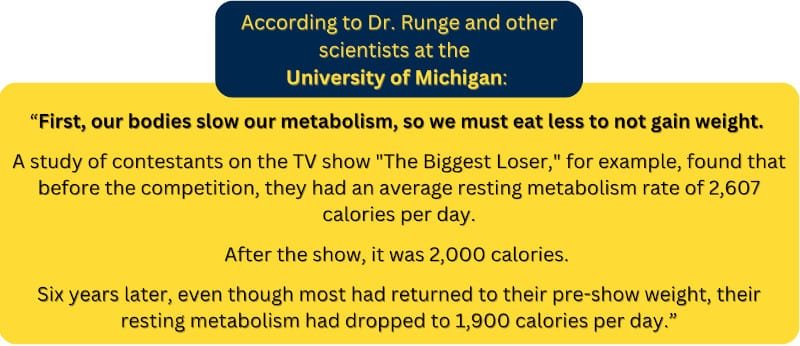
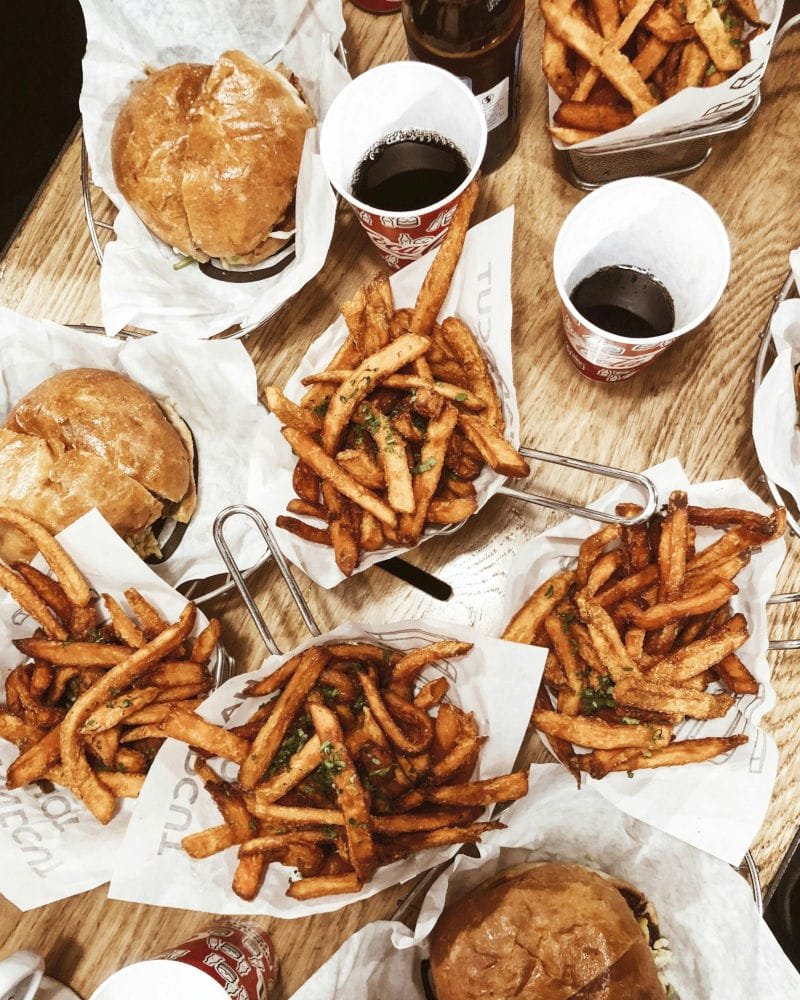
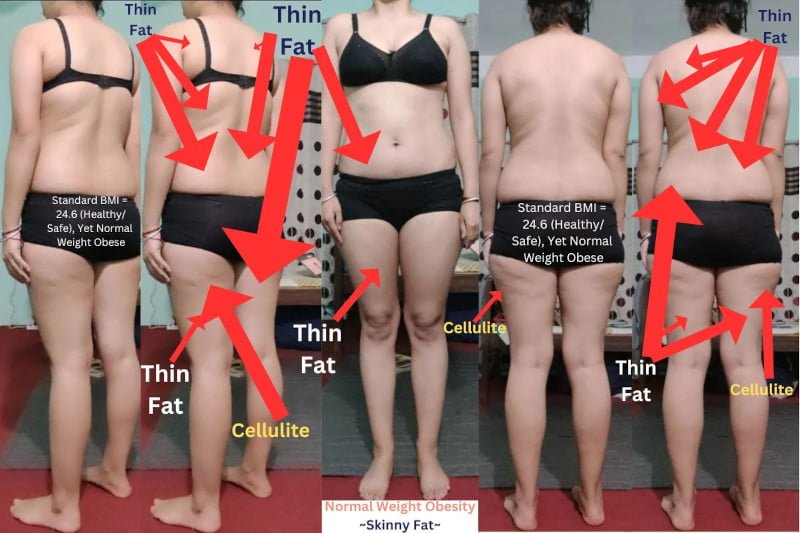
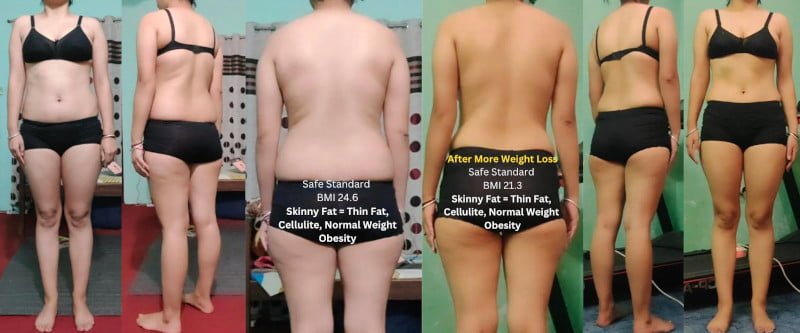





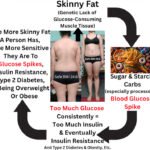



My brother recommended this site after every supposed fix i tried on social media did not work. This info made my day, thanks!
Feel free to ask questions.
I enjoyed that a lot
Tell your friends.
I read recently at https://www.eatthis.com/skinny-fat-cells-weight-gain/ that skinny fat is its own tissue that affects diet and weight loss. This new skinny fat science site is helpful, keep it up!
Yes, that it is true that skinny fat is unique genetic tissue. Our MRI Study is working on proving it once and for all. Thanks for the support.
This article was such a fantastic find! The information is right on point and ideal
for anyone focused on improving their health. I really appreciate
how you lay it all out in such a simple yet informative
way. I’ll definitely be sharing this on my blog
about diets and nutrition – my readers will really appreciate it.
Thanks for putting this together